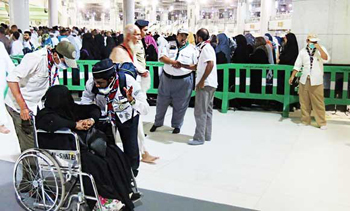 Jeddah, Aug 6: Authorities are gearing up to ensure the timely departure of foreign Umrah pilgrims over the next few days as the current Umrah season draws to a close.
Jeddah, Aug 6: Authorities are gearing up to ensure the timely departure of foreign Umrah pilgrims over the next few days as the current Umrah season draws to a close.
Almost 90 percent of foreign Umrah pilgrims had left the Kingdom by the end of Ramadan, while remaining pilgrims continue to leave the country daily.
The last departure date for foreign pilgrims is Aug. 11, according to officials.
“We will begin welcoming Haj pilgrims from abroad after that date,” Ali Al-Ghamdi of the Haj Ministry told Arab News. “More than six million pilgrims arrived in the Kingdom to perform Umrah despite a reduction in the overall number of visas this year,” he said.
“The majority of Umrah pilgrims are leaving from Jeddah, followed by Madinah, while many leave via land and sea, in particular from Yanbu,” he said.
“We have not noticed any delay in departures, as our electronic system effectively monitors pilgrim movement,” he said. “The Haj Ministry has also kept an eye on pilgrim facilities and services in both Makkah and Madinah and this includes ensuring effective transport means between the two cities,” he said.
“Haj Minister Bandar Hajar conducted a review meeting on Monday morning at his office in Jeddah to oversee final stage departure plans. The Haj Ministry is coordinating with civil aviation and passport authorities in executing the most efficient pilgrim departure plan to avoid delays.” The official attributed the successful implementation of the Umrah plan to the newly introduced electronic service.
Al-Ghamdi emphasized that the Haj ministry is determined to replicate last year’s success.
Haj pilgrims from South Africa will be first foreign pilgrims to arrive into the Kingdom later this month, he said.
“All three terminals at Jeddah’s King Abdulaziz International Airport (KAIA) are working at full capacity to facilitate the easy departure of foreign Umrah pilgrims,” a KAIA official told Arab News. “There are 70 counters working to process documents. More than 20,000 pilgrims leave through the Haj terminal every day,” he said.






Comments
Add new comment